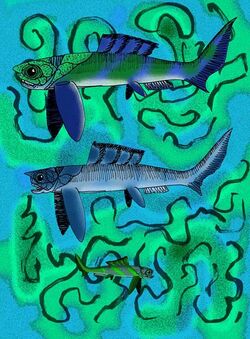Biology:Rhinosteus
| Rhinosteus | |
|---|---|

| |
| R. tuberculatus, R. traquairi and R. parvulus | |
| Scientific classification | |
| Domain: | Eukaryota |
| Kingdom: | Animalia |
| Phylum: | Chordata |
| Class: | †Placodermi |
| Order: | †Arthrodira |
| Suborder: | †Brachythoraci |
| Family: | †Selenosteidae |
| Genus: | †Rhinosteus Jaekel, 1911 |
| Species | |
| |
| Synonyms | |
| |
Rhinosteus is an extinct genus of small to medium selenosteid arthrodire placoderms of the Late Devonian known from the Upper Frasnian Kellwasserkalk facies of Bad Wildungen, Germany [1] and Morocco.[2]
Description
Rhinosteus is a typical genus of Kellwasserkalk selenosteids, with short cheeks, and slender inferognathal (lower jaw) plates. However, two of the species, R. traquairi and R. tuberculatus, have long, pointed rostrums, and tubercles on the plates. In R. traquairi, the rostrum is sharply pointed, extending beyond the snout, and the tubercles are small and irregularly placed. In R. tuberculatus, the rostrum is bluntly pointed, and the tubercles are large and plentiful. The species R. parvulus has a blunt rostrum that does not extend beyond the snout, and lacks tuberculation altogether.[1] The average skull length of R. traquairi is about 11 centimetres. The average skull length of R. tuberculatus is 15 centimetres, while that of R. parvulus is 4 to 6 centimetres.
Distribution
Fossils of R. traquairi and R. tuberculatus are found only in Bad Wildungen, Germany . R. parvulus is also found in Bad Wildungen. Rücklin (2011) discusses how specimens of small Rhinosteus have been found in the Kellwasserkalk facies of the Anti-Atlas Mountains of Morocco, and are tentatively referred to R. parvulus due primarily to their small size.[2]
Phylogeny
Rhinosteus is a member of the family Selenosteidae of the clade Aspinothoracidi, which belongs to the clade Pachyosteomorphi, one of the two major clades within Eubrachythoraci. The cladogram below shows the phylogeny of Rhinosteus:[3]
| Eubrachythoraci |
| ||||||||||||||||||||||||||||||||||||||||||||||||||||||||||||||||||||||||||||||||||||||||||||||||||||||||||||||||||||||||||||||||||||||||||
References
- ↑ 1.0 1.1 Denison, Robert (1978). Handbook of Paleoichthyology, Volume 2, Placodermi. New York: Gustav Fischer Verlage. pp. 97. ISBN 9780895740274.
- ↑ 2.0 2.1 RÜCKLIN, MARTIN (January 14, 2011). "First selenosteid placoderms from the eastern Anti-Atlas of Morocco; osteology, phylogeny and palaeogeographical implications". Palaeontology 56 (1): 25–62. doi:10.1111/j.1475-4983.2010.01026.x.
- ↑ Zhu, You-An; Zhu, Min; Wang, Jun-Qing (1 April 2016). "Redescription of Yinostius major (Arthrodira: Heterostiidae) from the Lower Devonian of China, and the interrelationships of Brachythoraci". Zoological Journal of the Linnean Society 176 (4): 806–834. doi:10.1111/zoj.12356. ISSN 0024-4082.
Wikidata ☰ Q7320683 entry
 |

